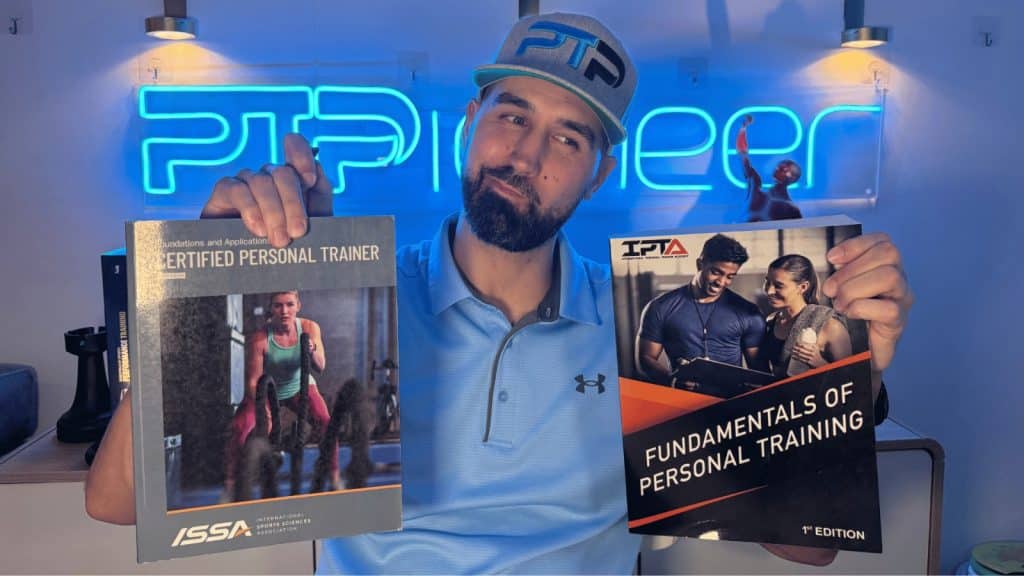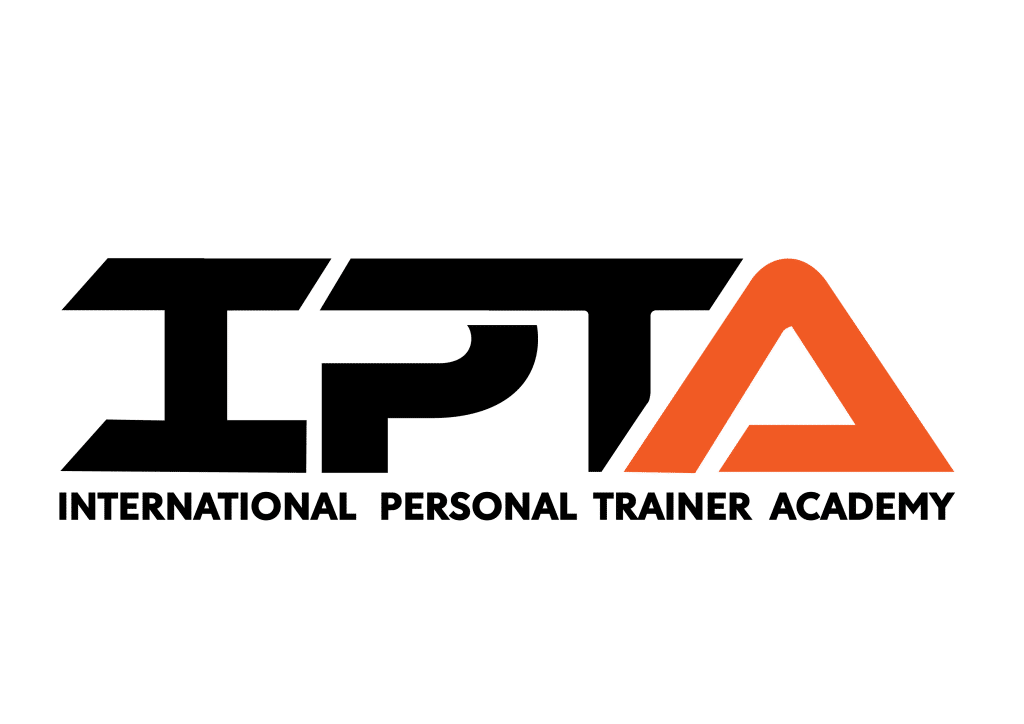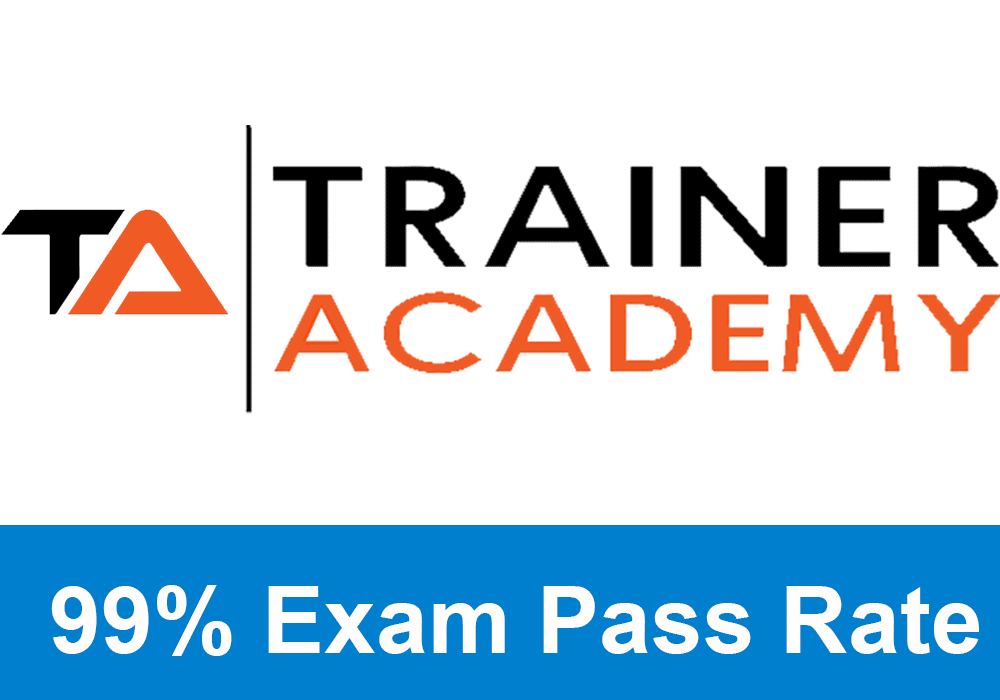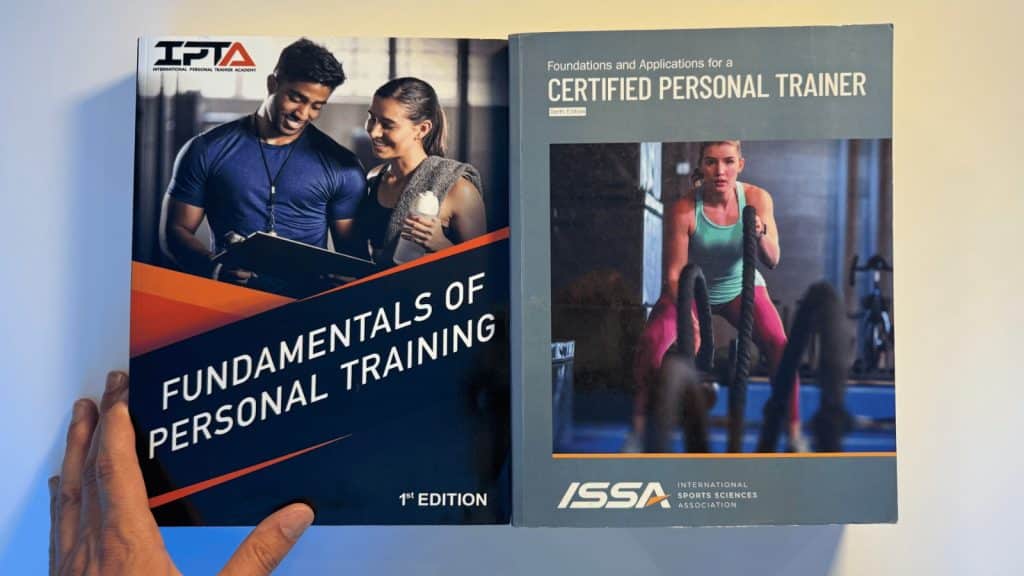
I’ve completed both the IPTA and ISSA CPT cert courses and while ISSA is still a solid choice for learners, the newer IPTA certification has overtaken ISSA’s spot and gets the overall recommendation from me. IPTA is newer and comes in at a higher value with it’s study materials. ISSA will still prepare learners in a proven and working classic model. Read the rest of the review to see how I compare and contrast these two excellent certifications.
IPTA and ISSA Quick Comparison
| CPT | Features | Price |
|---|---|---|

|
✔ Modern, tech-driven study tools (AI, flashcards, mnemonics) ✔ Job guarantee included in higher tiers ✔ Affordable, NCCA-accredited by default ✔ Free first recertification ✔ Fast average completion time |
View on IPTA Website |
|
|
✔ Long history and global brand recognition ✔ Strong bundle deals with specializations ✔ Flexible, self-paced study ✔ Extensive alumni network ✔ Option for NCCA or non-NCCA exam |
View on ISSA Website |
Two certifications that come up for comparison are the International Personal Trainer Academy (IPTA) Certified Personal Trainer program and the International Sports Sciences Association (ISSA) Certified Personal Trainer program.
If you’re deciding between IPTA’s Certified Personal Trainer (CPT) and the ISSA CPT, this breakdown will help you see where IPTA shines, where ISSA still has strengths, and which might suit your goals best.
Cut your Personal Trainer Certification study time in half with premium study materials for the programs in this article.
Use the code PTPMARCH to receive between 35% and 50% (depending on the program) off the Trainer Academy MVP Study System. Get the trial for any of their study systems here and check out my review for Trainer Academy here.
For more tips on which CPT is best for you, please take the quiz to determine which PT certification is the right fit.
Now, let’s dive in and see how the certifications and their companies compare, starting with the IPTA.
What is the IPTA CPT Certification?

The IPTA CPT is a relatively new but fast-growing certification that was built with modern trainers in mind. Unlike many traditional certifications that were developed decades ago and later adapted to today’s market, IPTA was created by a team already deeply familiar with the study systems used for other leading certifications.
In fact, IPTA originated out of Trainer Academy, a company known for helping thousands of students pass exams like NASM, ACE, and NSCA with their supplemental study materials. Drawing on that experience, IPTA designed its CPT certification to integrate those highly effective study systems directly into the program itself.
This means students don’t just get a textbook and exam—they also receive structured study aids like flashcards, mnemonics, weak-point tracking, AI-driven SurePass technology, exam simulators, and performance dashboards, all built to make passing faster and less stressful.
Add to that an NCCA accreditation, a job guarantee in certain packages, and a much lower cost than many competitors, and it’s clear why IPTA has quickly carved out a reputation as a modern, student-friendly certification.
The IPTA CPT certification stands out because it goes beyond test prep and focuses on the practical skills needed to succeed as a trainer. Sometimes they run a buy one get one free (BOGO) promotion, where enrolling in the IPTA CPT also includes the IPTA Certified Nutrition Specialist (CNS) program at no extra cost.
If that deal is available, I highly recommend taking advantage of it because it’s an incredible value—giving you two certifications that cover both training and nutrition, the two keys to client success and retention. At the very least, I suggest testing out their free trial, so you can explore the study materials and see what they offer at no cost.
What is the ISSA CPT Certification?

On the other hand, ISSA is one of the most established names in fitness education. Founded in 1988, the International Sports Sciences Association has certified over 500,000 fitness professionals across more than 90 countries.
Exclusive PTP CPT Offers |
||
|---|---|---|
Best Overall Cert | Best Online Cert | Best Study Materials |
Gold Standard Cert | A Good Option | Best CPT for you?  |
The ISSA CPT has long been viewed as a flexible and accessible option, particularly for students who want to study entirely online. ISSA is also well known for its wide variety of specialization programs—ranging from nutrition and strength training to corrective exercise and health coaching—which allows trainers to build a career with multiple niche skills under one provider.
ISSA’s CPT program provides a comprehensive foundation in anatomy, physiology, training techniques, and client programming. Its materials include a textbook, online course modules, exercise labs, quizzes, and access to student support forums.
One thing to note is that ISSA offers both NCCA-accredited and non-NCCA versions of its CPT. While the NCCA option is recognized by major gyms, the non-accredited path may be less valuable for those seeking traditional employment.
Because of its history, global recognition, and variety of specialization tracks, ISSA remains a very popular choice. However, the cost is higher than IPTA, and the study experience may not feel as streamlined or modern unless you purchase one of their larger bundles.
Employers and fitness professionals alike respect the International Sports Science Association. On top of that, ISSA offers fantastic deals on its products.
Similar to the IPTA CPT + Nutrition BOGO offer, the ISSA Elite Trainer Bundle is the feature purchase that makes ISSA worth it for anyone without a CPT certification already.
As a fitness professional with multiple certifications, I appreciate this and other offerings from ISSA.
IPTA vs ISSA Prerequisites
Both the IPTA CPT and ISSA CPT, like most major certifying organizations, share similar baseline requirements for becoming a certified personal trainer. To sit for either exam, candidates must meet the following criteria:
- Be at least 18 years of age
- Hold a high school diploma or equivalent (GED)
- Have a current and valid CPR/AED certification
Additionally, sitting for either exam requires a government-issued photo ID, so be sure to bring this with you on exam day.
IPTA CPT vs ISSA CPT Pros and Cons

When deciding between certifications, it helps to break them down across the areas that matter most: cost, study experience, accreditation and exam style, career support, and long-term growth. Below, you’ll see how IPTA and ISSA stack up side by side in each category.
Cost and Value
The IPTA CPT stands out as one of the most affordable NCCA-accredited certifications on the market. With a base package priced around $399, students receive both the exam and core study materials, which is not always the case with other providers.
Higher-tier options like the All-Star and MVP packages include even more—such as AI-powered study aids, a job guarantee, exam retakes, and a free first recertification—at a fraction of what many competitors charge. This makes IPTA particularly attractive to those who are budget-conscious but still want a high-quality certification.
By contrast, the ISSA CPT comes in at a significantly higher cost. ISSA’s packages do include study materials, and they sometimes bundle in specializations or extra courses during promotions, but the overall price tag is harder to overlook.
Financing options are available, which may help spread out payments, but most students will pay considerably more than they would for IPTA. The tradeoff is that ISSA’s longer history and global recognition may justify the price for some.
IPTA vs ISSA Study Materials and Learning Experience
One of IPTA’s greatest strengths lies in its modern study system. Rather than simply handing students a textbook and leaving them to self-study, IPTA integrates a wide range of tools designed to make learning more efficient.
These include spaced-repetition flashcards, audio guides, memory mnemonics, weak-point training modules, and even SurePass AI, which analyzes a student’s performance to pinpoint areas needing improvement. Add to this an exam simulator that replicates the real testing environment, and IPTA creates a comprehensive, tech-driven learning experience that shortens study time while boosting retention.
ISSA’s learning materials, while solid, lean on a more traditional approach. Students receive a textbook, online course modules, exercise labs, quizzes, and access to online student forums.
These resources cover the necessary knowledge thoroughly, but they do not include as many interactive or adaptive tools unless students invest in larger study packages. As a result, ISSA students may need to be more self-directed and disciplined in order to stay on track compared to the guided structure offered by IPTA.
Exam, Accreditation, and Difficulty
The IPTA CPT exam is fully NCCA-accredited, meaning students can be confident their credential will be recognized by gyms and employers across the country. To pass, candidates must score at least 72%, and prerequisites include a high school diploma or GED as well as current CPR/AED certification.
Certain IPTA packages also cover exam retakes, which minimizes risk for students. Overall, the exam is challenging but fair, and with the structured study system in place, students are well-prepared to succeed on the first attempt.
ISSA also offers an NCCA-accredited version of its exam, but it comes alongside a non-NCCA option that is open-book and easier to pass. While the open-book path can appeal to those worried about test anxiety, it is not as respected by many employers.
Those who want maximum career opportunities must be careful to enroll in the accredited version. Recertification requirements for ISSA are also similar, requiring 20 CEUs every two years along with CPR/AED. This means that, while ISSA can offer credibility, students need to make sure they choose the right track.
Career Support and Perks
IPTA has put significant emphasis on supporting students beyond just passing the exam. Its packages include perks such as a job guarantee, which gives new trainers confidence that their investment will lead to employment.
The certification also comes with a first free recertification, which cuts down on long-term costs, and many packages cover exam retakes. Some tiers even include a business course, which helps trainers think beyond the gym and into entrepreneurship. These additions make IPTA especially appealing for those just starting out who want reassurance and added value.
ISSA, on the other hand, relies heavily on its brand recognition and long track record in the industry. With over three decades of history and global reach, ISSA is a familiar name to employers worldwide, which can make job applications easier in certain markets.
ISSA also has an extensive alumni network and offers bundled specialization tracks, allowing trainers to expand into areas like nutrition, corrective exercise, or senior fitness under the same provider. While this prestige and variety of options is a strong advantage, it does come at a higher cost compared to IPTA’s student-friendly approach.
Long-Term Career Growth
IPTA, being newer to the industry, does not yet offer the same wide array of advanced specialty certifications. However, it compensates with affordability and ease of maintenance, including a first free recertification and lower renewal costs.
For trainers who primarily want to enter the field without overextending their budget, IPTA remains highly appealing. Still, those who anticipate pursuing multiple specialty tracks may find ISSA’s broader catalog more advantageous over time.
For long-term development, ISSA takes the lead due to its sheer number of advanced specialization certifications. Trainers can pursue pathways in strength and conditioning, corrective exercise, nutrition, and many other fields, eventually progressing to programs like ISSA’s Elite Trainer or Master Trainer tracks.
This breadth of continuing education makes ISSA a good choice for those who want to build an expansive portfolio under a single certification provider.
Which Exam Is Harder: IPTA or ISSA?
When it comes to exam difficulty, both certifications have their challenges, but the testing experience is quite different.
The IPTA CPT exam is NCCA-accredited by default, which means it follows the strict standards required by gyms and employers. The test requires a 72% passing score, and with a mix of multiple-choice questions that cover anatomy, physiology, training principles, and program design, it’s considered a challenging but fair exam. Because IPTA integrates advanced study tools such as weak-point tracking, spaced-repetition flashcards, and SurePass AI, many students find that preparing for this exam feels more structured and manageable than with older certifications. Still, the accreditation ensures the test cannot be “too easy,” making it a serious but passable hurdle for well-prepared candidates.
The ISSA CPT exam, on the other hand, comes in two formats: an open-book, non-NCCA version, and a NCCA-accredited version. The open-book exam has a reputation for being one of the easiest in the industry, since students can reference their materials as they go. While this makes passing more accessible, it also means some employers do not view the non-accredited ISSA exam as credible. The NCCA-accredited ISSA exam is more rigorous and better recognized but does not offer the same open-book flexibility. The passing score is usually in the 70–75% range, similar to IPTA.
Verdict: If you compare the accredited versions, the IPTA and ISSA exams are similar in terms of rigor and difficulty, with both requiring strong preparation. However, because ISSA still offers the open-book non-NCCA option, many find ISSA easier to pass—though this comes with the tradeoff of reduced credibility. IPTA ensures that every student earns an accredited, recognized credential, which sets a higher baseline standard for exam difficulty and industry respect.
Bottom Line and Recommendation
In the end, both certifications come with unique strengths. IPTA CPT is ideal for students who want a modern, affordable, and efficient program that gets them certified and working quickly. Its innovative study tools, built-in perks, and job guarantee make it especially beginner-friendly.
ISSA CPT, by comparison, is best suited for those who want the reassurance of a globally recognized brand name, access to dozens of specialization tracks, and a more established alumni network—even if it means paying more upfront.
Both the IPTA CPT and ISSA CPT are strong certifications that can help launch or advance your personal training career. Each offers solid educational content, industry recognition, and the ability to work with clients in gyms or online settings.
The ISSA CPT shines in terms of its long history, global brand recognition, and wide range of specializations. If you’re looking for a credential with international credibility and a clear path to add niche expertise over time, ISSA remains a highly respected option.
That said, the IPTA CPT delivers exceptional value and innovation. With its modern study system, built-in exam prep tools, job guarantee, and affordability, IPTA makes certification more accessible without sacrificing credibility thanks to its NCCA accreditation. For most new trainers who want to pass confidently, start working quickly, and keep costs down, IPTA is the better overall choice.
Final Verdict: Both certifications can get you where you want to go, but if you’re weighing cost, study experience, and immediate career support, IPTA CPT earns the higher rating and recommendation.

 Have a question?
Have a question? 
Tyler Read
PTPioneer Editorial Integrity
All content published on PTPioneer is checked and reviewed extensively by our staff of experienced personal trainers, nutrition coaches, and other Fitness Experts. This is to make sure that the content you are reading is fact-checked for accuracy, contains up-to-date information, and is relevant. We only add trustworthy citations that you can find at the bottom of each article. You can read more about our editorial integrity here.